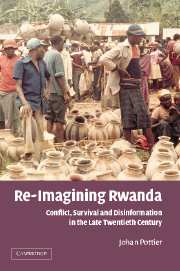Book contents
- Frontmatter
- Contents
- List of maps
- Acknowledgements
- List of abbreviations
- Rwanda
- Great Lakes region
- Rwanda: refugees and displaced populations, 31 March 1995
- Introduction: information and disinformation in times of conflict
- 1 Build-up to war and genocide: society and economy in Rwanda and eastern Zaire
- 2 Mind the gap: how the international press reported on society, politics and history
- 3 For beginners, by beginners: knowledge construction under the Rwandese Patriotic Front
- 4 Labelling refugees: international aid and the discourse of genocide
- 5 Masterclass in surreal diplomacy: understanding the culture of ‘political correctness’
- 6 Land and social development: challenges, proposals and their imagery
- Conclusion: representation and destiny
- Appendix: Summary of key dates and events
- Notes
- Bibliography
- Index
- Titles in the series
6 - Land and social development: challenges, proposals and their imagery
Published online by Cambridge University Press: 22 September 2009
- Frontmatter
- Contents
- List of maps
- Acknowledgements
- List of abbreviations
- Rwanda
- Great Lakes region
- Rwanda: refugees and displaced populations, 31 March 1995
- Introduction: information and disinformation in times of conflict
- 1 Build-up to war and genocide: society and economy in Rwanda and eastern Zaire
- 2 Mind the gap: how the international press reported on society, politics and history
- 3 For beginners, by beginners: knowledge construction under the Rwandese Patriotic Front
- 4 Labelling refugees: international aid and the discourse of genocide
- 5 Masterclass in surreal diplomacy: understanding the culture of ‘political correctness’
- 6 Land and social development: challenges, proposals and their imagery
- Conclusion: representation and destiny
- Appendix: Summary of key dates and events
- Notes
- Bibliography
- Index
- Titles in the series
Summary
The resuscitated, functionalist narrative on Rwandan society and history is also ‘at work’ in the design of policy initiatives for rural reconstruction. This chapter focuses on land reform and its rationale, and shows how the policy documents that justify reform portray allocative practices in the past, present and future. The aim of land reform, I argue, may well be to rationalise existing practices and boost production, as officials and experts claim, yet the discourse of reform also acts as an instrument which, through its representation of the past, helps to legitimate the present. A second aim of the chapter is to contrast post-genocide policy guidelines with the lived reality of land allocation and use. Via an empirical look at two sets of policy guidelines – first, on the repossession of temporarily vacated property; second, on land tenure reform and villagisation – I will suggest that policy implementation is more likely than not to be a matter of policy interpretation.
This chapter begins with a general appreciation of ‘the trouble’ with land and an account of how Rwanda's ‘traditional’ systems of land access and use evolved in the earlier part of the twentieth century. A discussion of post-genocide challenges and solutions then follows, before we conclude by considering the role of policy discourse in the rewriting-of-history project: a development priority on which earlier chapters have also focused. The rewriting upholds allocative practices that favour returnees and the regime they represent.
- Type
- Chapter
- Information
- Re-Imagining RwandaConflict, Survival and Disinformation in the Late Twentieth Century, pp. 179 - 201Publisher: Cambridge University PressPrint publication year: 2002



